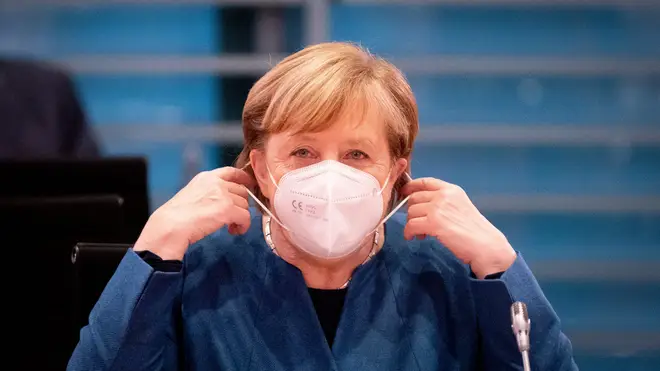
Matthew Wright 7am - 10am
28 October 2020, 15:17 | Updated: 28 October 2020, 15:53

Angela Merkel has announced a partial lockdown lasting one month to curb the spread of Covid-19 in Germany.
Talks between Angela Merkel and German state leaders have ended with an agreement for a partial lockdown.
The lockdown will come into effect on November 2 and will see bars and restaurants closing.
Shops will be allowed to remain open on condition that there is only one customer per 10 square metres of space.
According to the federal government's proposal, all leisure facilities such as theatres, operas, cinemas, swimming pools and fitness studios, but also bars, clubs, discos and pubs will close.
But the "delivery and collection of takeaway meals for consumption at home" will remain open.
Also, schools, kindergartens will remain open too.
The rules will apply until November 30.
The plan has caused anguish in Germany's hospitality industry, with thousands of venue owners staging a protest at Berlin's landmark Brandenburg Gate to demand further financial support from the government.
Read more: Staffordshire becomes latest area to be put under Tier 2 restrictions

Deputy chief medical officer: Rising coronavirus cases are a concern
Some 14,964 coronavirus cases were reported in Germany on Tuesday, which was the highest daily total since May.
That brought the country's seven-day rate of cases per 100,000 people to 101, up from 56 a week ago.
Germany could lose its exemption from the UK's quarantine policy when the Government announces the weekly update to its list of travel corridors at 5pm on Thursday.
Paul Charles, chief executive of travel consultancy The PC Agency, said the Government is "very likely" to remove the quarantine exemption for people arriving from Germany.
He said: "Its numbers on every criteria are heading in the wrong direction. It's now firmly in the quarantine zone.
"It's had a very sudden increase. In the last two weeks its infection rate has gone up by nearly 200%.
"On the measure of testing positivity it's gone above 4%, so that indicates widespread community transmission, which is not something the Government likes to see in their decision-making."
Germany requires visitors from the UK to enter quarantine for 14 days unless they can provide evidence of a negative test that is no older than 48 hours, or get tested on arrival.
Listen & subscribe: Global Player | Apple Podcasts | Google Podcasts | Spotify
The World Health Organisation said more than two million confirmed coronavirus cases were reported last week - the shortest time ever for such an increase.
It said for the second consecutive week, the European region accounted for the biggest proportion of new cases, with more than 1.3 million cases, or about 46% of the worldwide total.
The UN health agency said deaths were also on the rise in Europe, with around a 35% spike since the previous week.
Overall, Europe has seen more than 250,000 virus-related deaths, according to a tally by Johns Hopkins University.
Read more: 'Too early to say' how Covid lockdowns could affect Christmas, Cabinet minister tells LBC

"It's nonsense that police will charge homes at Christmas"
France is also preparing for new lockdown measures.
French markets opened lower on expectations that President Emmanuel Macron will announce tough measures during a televised evening address to the nation.
Doctors in France are calling on the government to impose a new nationwide lockdown, noting that more than half of the country's intensive care units are now occupied by Covid-19 patients and medical staff are under increasing strain.
On Tuesday, the country recorded an additional 523 deaths and another 33,417 new infections.